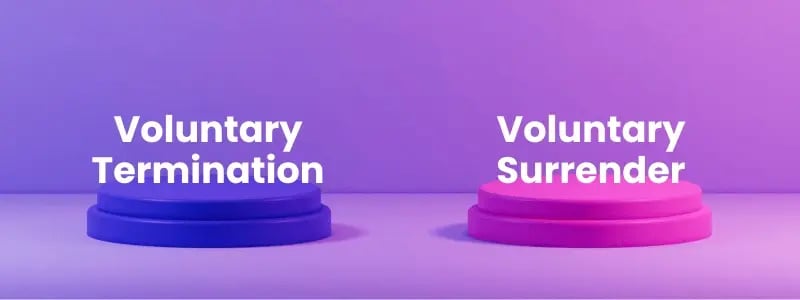Voluntary Termination Vs Voluntary Surrender, What’s The Difference?
by Jamie Burgoyne on Jun 13, 2025 3:47:18 PM
👉 What is voluntary surrender?
👉 Voluntary termination vs voluntary surrender
👉 Voluntary termination with a PCP agreement
👉 Voluntary termination with a HP agreement
👉 Common reasons to voluntarily terminate a car finance agreement
👉 Vulnerability and early termination
👉 How Marsh Finance can support you
👉 Support beyond Marsh: trusted free resources
👉 FAQs
If you're feeling overwhelmed by your car finance payments, you're not alone, and there are options available to help you regain control. Two common ways to end a car finance agreement early are Voluntary Termination (VT) and Voluntary Surrender (VS). Although they sound similar, they have very different consequences.
In this guide, we'll break down:
- What voluntary termination and voluntary surrender actually mean
- The pros and cons of each
- Who might qualify, including vulnerable customers
- How Marsh Finance can support you
- Where else to turn for help
Whether you're exploring your legal rights or just need a fresh start, understanding your options is the first step.

What is Voluntary Termination (VT)?
Voluntary termination is a legal right under the Consumer Credit Act 1974 that allows you to end your car finance agreement early, without facing extra charges, as long as certain conditions are met.
To qualify, you must:
- Have a Hire Purchase (HP) or Personal Contract Purchase (PCP) agreement
- Have paid at least 50% of the total amount owed (this includes interest, fees, and any balloon payment in a PCP deal)
- Return the car in reasonable condition (fair wear and tear is expected)
If you meet these terms, you can return the car and walk away with nothing more to pay, unless the vehicle is damaged or has exceeded mileage limits (for PCPs).
✅ Best for: People who are up to date with payments and want to end the agreement fairly and legally.

What is Voluntary Surrender (VS)?
Voluntary surrender means you hand the car back to the finance company even if you haven’t reached the 50% repayment threshold. It’s not a protected legal right like VT, it’s simply an option for those who can’t continue making payments.
However, unlike VT, you’ll still owe:
- The remaining balance of the agreement
- Any charges or fees
- The cost of selling the car, if it doesn’t cover what you owe
Your lender will usually sell the car at auction, and you’ll be responsible for covering any shortfall.
⚠️ Best for: People who are struggling significantly and can no longer keep the car, but haven’t reached the VT threshold.

Voluntary Termination vs Voluntary Surrender: Quick Comparison
|
Feature |
Voluntary Termination (VT) |
Voluntary Surrender (VS) |
|
Legal right? |
✅ Yes (Consumer Credit Act) |
❌ No |
|
Must repay 50% of agreement? |
✅ Yes |
❌ No minimum |
|
Still owe money after return? |
❌ Usually no (if conditions met) |
✅ Yes, balance minus resale |
|
Car condition matters? |
✅ Yes, reasonable condition |
✅ Yes, resale value matters |
|
Impacts credit file? |
⚠️ May show as settled early |
⚠️ May show default if unpaid |
.webp?width=800&height=300&name=Car-Finance-Coins-4%20(3).webp)
Voluntary Termination With A PCP Agreement
If you’re thinking about voluntarily terminating a PCP (Personal Contract Purchase) car finance agreement, there are some key things to consider. To be eligible, you must have repaid at least 50% of the total amount payable, which includes the loan amount, interest, fees, and charges. Importantly, the car must also be returned in good condition, with no excessive wear and tear.
With PCP agreements, many customers forget that the balloon payment (the lump sum due at the end) counts toward the total amount payable. Because this balloon payment is typically large and due at the end of the contract, most people haven’t reached the 50% repayment mark early in the agreement, which means you may need to pay extra to reach that threshold before you can exit through voluntary termination.
.webp?width=800&height=300&name=Considering-Car-Finance%20(1).webp)
Voluntary Termination With A HP (Hire Purchase) Agreement
Ending a Hire Purchase (HP) car finance agreement early through voluntary termination is typically more straightforward than PCP, as there’s no balloon payment involved. To qualify, you’ll need to have paid at least 50% of the total amount payable, which includes the car price, interest, and any fees.
If you haven’t yet hit the halfway point in your agreement, you may still choose to voluntarily terminate, but you’ll need to top up the balance to reach the 50% threshold first. Once you’ve done that, you can return the car in reasonable condition and walk away from the contract with no further payments due.
This option is often used by drivers facing financial difficulty, life events, or a change in circumstances that make continued car ownership impractical or unaffordable.

Common Reasons To Voluntarily Terminate A Car Finance Agreement
Voluntary termination is often used by people who are facing financial hardship, experiencing life changes, or simply no longer need the car. Some of the most common reasons include: a drop in income due to redundancy or reduced hours, health issues that affect driving or working, relationship breakdowns, or changes in lifestyle, such as relocating to a city with better public transport. Others choose to voluntarily terminate when they realise the car is no longer affordable, or they want to avoid long-term debt tied to a vehicle they no longer value. Because this is a legal right under the Consumer Credit Act, it gives you a way to walk away from your agreement early, fairly and with dignity, as long as you’ve met the 50% repayment threshold.

Vulnerability and Early Termination
If you're considering VT or VS due to illness, bereavement, redundancy, or other life challenges, you may be classed as a vulnerable customer. This could mean you're entitled to extra support, including:
- Breathing space or payment holidays
- Easier communication options
- Flexibility with how your case is handled
- No-pressure discussions and empathetic treatment
.webp?width=800&height=300&name=Helping-Hand-1%20(1).webp)
How Marsh Finance Can Support You
At Marsh Finance, we know that life happens. Whether you're exploring voluntary termination, surrender, or simply unsure what to do next, our goal is to help you move forward, not punish you.
We offer:
- Clear guidance on whether VT or VS is right for you
- Settlement figures and car condition assessments
- Support for vulnerable customers
- Access to our accessibility website tools
- No judgment, just help
👉 Contact our team confidentially »
🔎 Review our Vulnerable Customer Policy

Support Beyond Marsh: Trusted Free Resources
If you're in financial difficulty, we recommend getting advice from independent services:
Financial Support & Debt Help
- StepChange Debt Charity – stepchange.org
- National Debtline – nationaldebtline.org
- Citizens Advice – citizensadvice.org.uk
Mental Health & Wellbeing
- Mind – mind.org.uk
- Samaritans – Call 116 123
- Cruse Bereavement Support – cruse.org.uk
.webp?width=800&height=300&name=Car%20Question%20(1).webp)
FAQs
What is the difference between voluntary termination and voluntary surrender?
Voluntary termination is a legal right under the Consumer Credit Act that allows you to end a car finance agreement early, with no further payments, as long as you’ve repaid at least 50% of the total amount owed and the car is in good condition.
Voluntary surrender, on the other hand, is an option where you hand the car back without meeting the 50% repayment threshold. However, you’ll still owe the remaining balance after the car is sold minus its resale value.
Can I end my car finance agreement early?
Yes. You can end a car finance agreement early through either:
- Voluntary termination (once you've repaid 50%)
- Voluntary surrender (if you can't afford to continue but haven’t repaid 50%)
- Or by requesting an early settlement and paying off the agreement in full
Each option has different financial implications, so it’s important to speak to your lender or get independent advice first.
Is voluntary termination bad for your credit score?
Not usually. If you follow the correct process, voluntary termination should not negatively impact your credit score. It may appear on your credit file as a “settled” account but won’t be recorded as missed or defaulted unless you were already behind on payments.
👉 Learn more: Understanding Your Car Finance Help and Rights
Do I have to pay the balloon payment to end a PCP agreement?
If you're ending your PCP agreement through voluntary termination, the balloon payment is included in the 50% total. This means you may need to pay a top-up amount to meet the threshold, especially if you’re still in the early stages of your contract.
👉 Need help calculating? Contact our support team confidentially »
What happens if I voluntarily surrender my car?
With voluntary surrender, you return the car before reaching the 50% repayment point. Your lender will sell the vehicle, usually at auction, and you will be liable for any shortfall between the car’s resale value and the remaining balance on your loan. This can still impact your credit file if payments are missed or the remaining debt isn’t cleared.
Get financial support: StepChange Debt Charity
I’m struggling financially. Which option is better for me — VT or VS?
If you’ve already paid at least 50% of your total finance agreement, voluntary termination is likely the better option, as it protects your legal rights and avoids extra debt. If you haven’t reached that point and can no longer afford payments, voluntary surrender may still be possible, but you’ll need to cover any remaining balance.
👉 Explore: 5 Ways to Take Back Control of Your Finances in 2025
Can I get help if I want to terminate my finance due to illness or job loss?
Yes, if you’re facing illness, bereavement, redundancy, or other major life changes, you may be classed as a vulnerable customer. At Marsh Finance, we offer tailored support, flexible options, and no-pressure conversations to help you make the best choice for your circumstances.
What condition should the car be in when I return it under voluntary termination?
The car should be in reasonable condition, reflecting fair wear and tear for its age and mileage. Excessive damage, missing parts, or unreported issues may result in additional charges. It’s always best to get the car cleaned and checked before returning it.
👉 Get support: Understanding Your Car Finance Help and Rights
Can I end my HP finance agreement early with voluntary termination?
Yes, Hire Purchase (HP) agreements can be ended early via voluntary termination once you’ve paid 50% of the total amount owed. There’s no balloon payment involved, making VT with HP typically simpler than with PCP. If you haven’t paid 50% yet, you can still terminate early by topping up the difference.
Where can I get free help deciding between voluntary termination and surrender?
Independent support is available through:
- StepChange – stepchange.org
- National Debtline – nationaldebtline.org
- Citizens Advice – citizensadvice.org.uk
- Mind or Samaritans – for mental health support
- January 2026 (9)
- December 2025 (9)
- November 2025 (3)
- October 2025 (12)
- September 2025 (8)
- August 2025 (13)
- July 2025 (25)
- June 2025 (17)
- May 2025 (10)
- April 2025 (5)
- March 2025 (6)
- February 2025 (4)
- January 2025 (4)
- December 2024 (10)
- November 2024 (14)
- October 2024 (12)
- September 2024 (25)
- August 2024 (74)
- February 2024 (1)
- May 2023 (2)
- March 2023 (1)
- February 2023 (1)
- December 2022 (1)
- October 2022 (2)
- August 2022 (1)